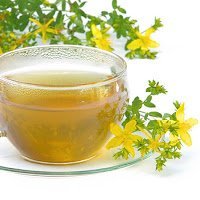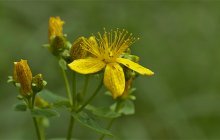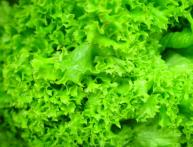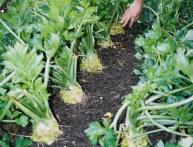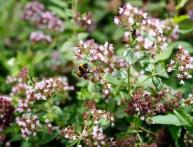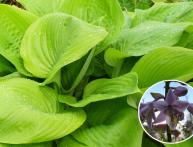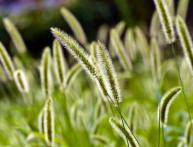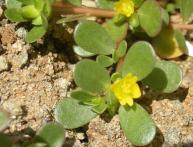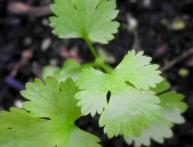Medicinal herb St. John's wort: cultivation, care, use
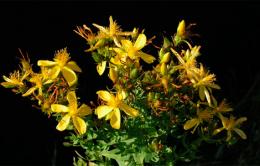
St. John's wort has been known since ancient times for its medicinal properties; it used to be collected in the field, but now it is not at all difficult to grow it right in your dacha.
Content:
- growing St. John's wort in the country: sowing, plant care
- beneficial properties of St. John's wort
- use of St. John's wort in folk medicine, recipes
- contraindications and side effects of St. John's wort
Growing St. John's wort in the country: sowing, care
St. John's wort begins to germinate already at a temperature of five to six degrees above zero. It is optimal to sow it either in autumn or early spring. The most comfortable temperature for seed germination is 20 degrees above zero.
It is optimal to plant seedlings of St. John's wort seeds, but if you need a large number of plants, you can plant seeds. Seeds are sold in stores, or can be ordered from summer residents on the Internet.
To sow St. John's wort seeds, you need land that is well cleared of weeds; it is best if onions or carrots grew here before. There is no need to particularly prepare the soil, everything is the same as with other plants: plow, fertilize, harrow as necessary if the soil has become compacted. Seeds should be sown in rows at intervals of about 30 centimeters.
Pre-winter sowing ensures earlier shoots of St. John's wort and a richer harvest.
In the first year, St. John's wort does not bloom. This is a perennial plant. This year, the rows of St. John's wort should be weeded three times to remove weeds, since the young plant is much more vulnerable.Thus, weeds interfere with the intensive growth of St. John's wort.
Harvesting is necessary during the flowering period of St. John's wort, namely in the period of late June - early July.
Two crops are usually harvested during the summer. To do this, it is necessary to cut off the tops with flowers approximately thirty centimeters long; the plant must be dried immediately, otherwise it will turn black and will be unsuitable for use. After about a month, you can harvest the second harvest.
Useful properties of St. John's wort
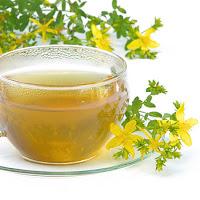
St. John's wort is known in folk medicine as a storehouse of useful substances and an assistant for many diseases.
Since ancient times, St. John's wort has been known for its medicinal properties and, as they said before, heals 99 diseases!
Of course, it is difficult to talk about all the wonderful properties of this plant in one article. Let's look at some of them, the most popular and famous.
St. John's wort is also used in traditional medicine as an expectorant and anti-inflammatory agent, and is also used for gum disease, colic and cough.
Among the people, the use of St. John's wort is more extensive. St. John's wort is used for internal and external use. It is taken internally as a hemostatic agent for uterine bleeding, for renal disease, kidney disease, as an anthelmintic, and also for cardiovascular diseases.
When used externally, St. John's wort is used as an additive in bathing water for children suffering from diathesis and other skin diseases, rashes, and skin tuberculosis. For breast disease in women, compresses are used.
St. John's wort recipes
As mentioned earlier, St. John's wort has medicinal properties, but the treatment of various diseases requires different forms of preparation of St. John's wort medicine.
St. John's wort oil is used to treat skin, in particular diathesis, rashes, and burns.
To prepare the oil you will need:
- 20 grams of St. John's wort flowers
- 200 grams of flaxseed or sunflower oil
Pour vegetable oil over St. John's wort flowers, place in a cool, dark room, leave for two weeks, shaking occasionally.
The oil will turn out bright red. Strain and lubricate the affected areas of the skin.
For diseases of the mammary glands and for bathing children, a decoction of St. John's wort is used.
An alcohol tincture (extract) is taken internally.
To prepare the extract you will need:
- 4 tablespoons of dry herb St. John's wort
- 100 ml alcohol
Pour alcohol over the herb and leave for ten days in a cool, dark room, strain. To take, add a few drops of extract to water. Take three times a day, maximum 50 drops per day.
Contraindications
St. John's wort increases blood pressure, so it should not be used by hypertensive patients; it is also contraindicated in any form during pregnancy.
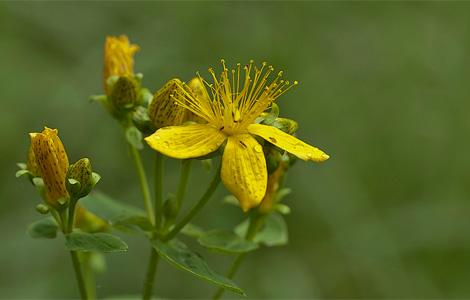
After using St. John's wort, you should avoid exposure to the sun, as it reduces the skin's defense mechanisms against ultraviolet radiation.
St. John's wort can also cause stomach pain if overused. In addition, it can cause temporary impotence during use, but after use it goes away!

